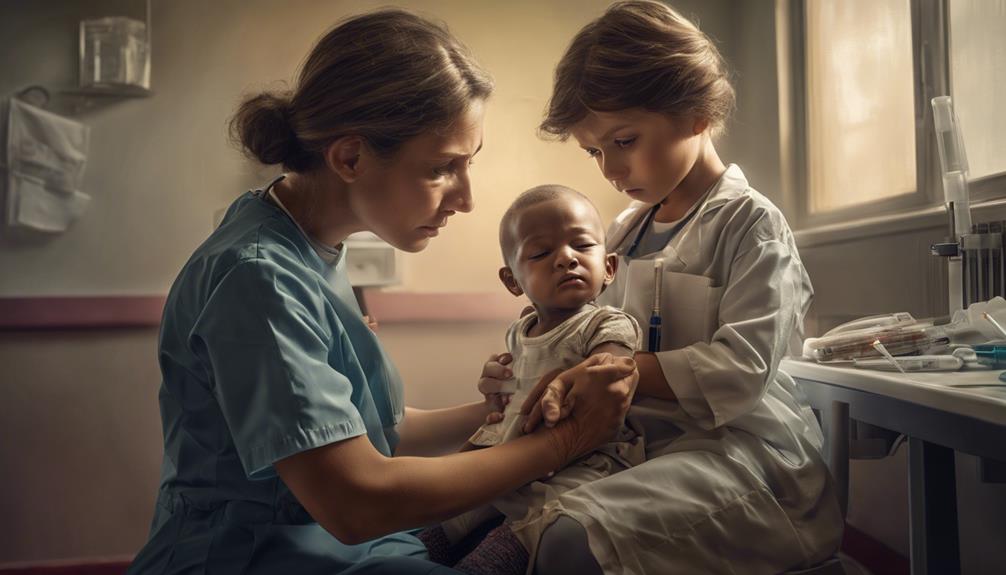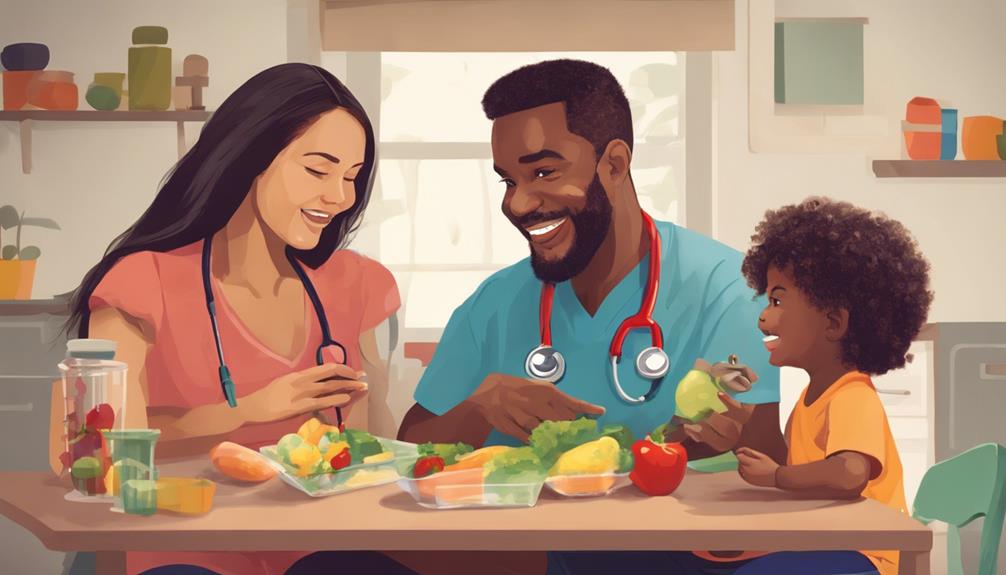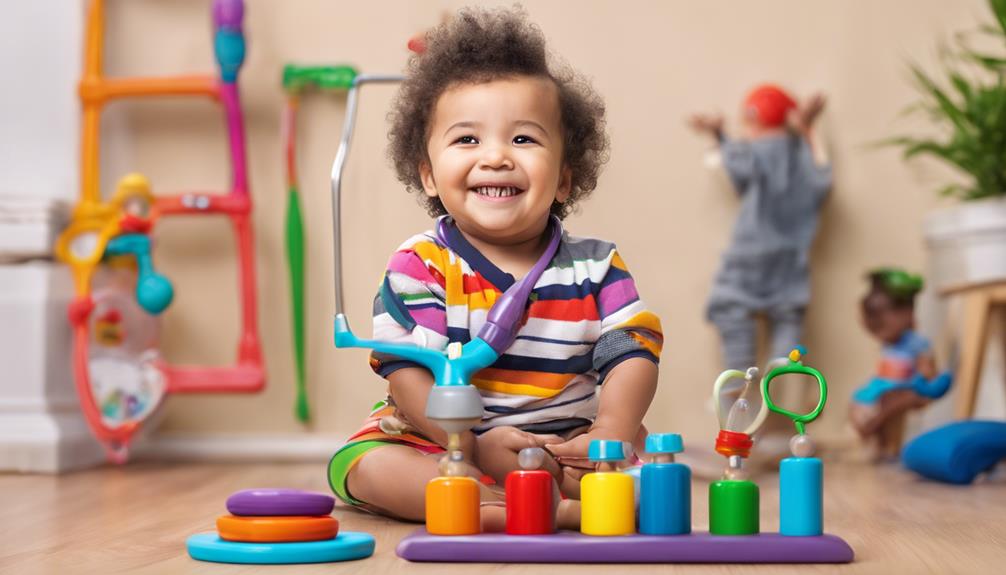Alright, folks, let's explore what the 2-year check entails. From growth assessments to developmental screenings, this examination plays a critical role in monitoring your child's progress.
But what about the finer details? Stay tuned to uncover the nitty-gritty of vaccinations, nutrition discussions, and safety measures that make this checkup a cornerstone in your little one's health journey.
So, what exactly goes down during this milestone appointment? Keep on scrolling to find out more about the thorough care your child receives at this pivotal stage.
Key Takeaways
- Growth assessment includes weight, height, and head circumference tracking.
- Physical health examination covers BMI calculation, eye check, and vaccinations.
- Developmental milestones screening focuses on language, social, and cognitive skills.
- Discussions encompass nutrition, safety, behavior, and addressing parental concerns.
Growth and Development Assessment
During the 2-year check, we evaluate your child's growth by measuring weight, height, and head circumference to track their development on a growth chart. It's a vital time to evaluate various developmental milestones such as language skills, social interactions, and motor skills. We observe how they communicate, interact with others, and handle physical tasks to make sure they're progressing as expected.
Additionally, we pay close attention to behavioral aspects like eating habits, potty training readiness, and sleep patterns. Understanding these aspects helps us support your child's overall well-being and development. By looking at these different facets, we gain insights into their unique strengths and areas where they may need additional support.
This holistic approach allows us to address any concerns early on and provide guidance to enhance their growth and development. The 2-year check also involves evaluating their readiness for potty training, making sure they're physically prepared for this milestone.
Physical Health Examination

As we move on to the Physical Health Examination, our focus shifts to conducting a thorough assessment of your child's overall well-being and growth during the 2-year checkup. Here are some key aspects of the physical examination that you can expect:
- Weight, Height, and BMI: The pediatrician will measure your child's weight and height, calculate their Body Mass Index (BMI), and plot these on a growth chart to track their development.
- Eye Exam: An examination of your child's eyes will be conducted to make sure their vision is developing correctly.
- Immunizations: Updates on essential vaccinations will be provided to protect your child from common childhood illnesses.
- Overall Well-being: The physical examination plays an important role in monitoring your child's overall health and growth trajectory.
- Assessment of Childhood Illnesses: The pediatrician will check for any signs or symptoms of common childhood illnesses to make sure early detection and intervention if needed.
During this examination, we aim to provide a thorough evaluation of your child's physical health, fostering a foundation for their well-being and growth.
Developmental Milestones Screening

In our dedication to thorough care, we prioritize evaluating your child's developmental milestones during the 2-year check, focusing on language, social, and cognitive advancements. Pediatricians utilize standardized tools and keen observations to assess your child's progress in reaching essential developmental milestones.
Screening at this age is important as it helps us identify any delays or concerns early on, enabling timely intervention and support. Language development milestones may include combining words, social skills could involve playing with others, and cognitive abilities might encompass problem-solving skills.
Vaccinations and Immunizations

Let's guarantee your child receives essential vaccinations to safeguard their health and well-being. When it comes to immunizations, we prioritize protecting your little one from common childhood diseases. Here are some key points to think about during the 2-year checkup:
- Essential childhood immunizations like hepatitis B, DTaP, and IPV provide important protection.
- Missing any shots can be caught up during this visit to make sure complete vaccination coverage.
- Additional vaccines such as hepatitis A, influenza, and COVID-19 may be recommended based on current guidelines.
- A blood draw might be conducted to screen for conditions such as anemia or lead exposure, ensuring your child's overall health is assessed thoroughly.
- The 2-year checkup includes a crucial discussion on the importance of timely vaccinations to support your child's immune system effectively.
Nutrition, Safety, and Behavior Discussions

Understanding the significance of nutrition, safety, and behavior is important for nurturing your child's overall well-being and development.
When it comes to nutrition, promoting healthy eating habits through appropriate meal and snack frequency is key. Discussing choking hazards and guiding on serving sizes can help guarantee your child's safety during meals.
Addressing home and outdoor safety measures is critical in preventing accidents and promoting a secure environment for your child to thrive. Additionally, offering tips on positive behavior reinforcement and setting consistent rules can contribute to a harmonious household atmosphere.
Open communication about developmental milestones and concerns is essential for understanding your child's growth and addressing any challenges that may arise.
Frequently Asked Questions
What Do They Do at 2 Year Check Up?
At the 2-year check-up, we typically undergo a thorough physical exam by our pediatrician, discuss any missed vaccines, review COVID-19 guidelines for toddlers, and update immunizations for childhood illnesses. It's important for our health.
What Questions Are Asked at the 2 Year Wellness Check?
We discuss various topics during the 2-year wellness check, such as developmental milestones, behavior, nutrition, and safety. Pediatricians ask about eating habits, sleeping patterns, and toilet training progress. They focus on screen time limits, social interactions, and language development.
What Is a 2 Year Old Assessment?
At two, our little one's evaluation is a thorough check-up. It includes a physical exam, developmental screenings, immunizations, nutrition advice, and safety tips. It's a way to guarantee our child's health and growth!
Do Toddlers Get Shots at 30 Months?
Yes, toddlers typically receive booster shots at 30 months to maintain immunity against diseases like measles, mumps, rubella, and varicella. These vaccines, including DTaP, IPV, MMR, and chickenpox, help protect against serious infections and guarantee community health.
Conclusion
As we wrap up the 2-year check, we guarantee your little one is on the right track for growth and development.
Remember, just like a caterpillar transforms into a butterfly, our children are blossoming into their own unique selves.
Let's continue nurturing their health, safety, and well-being together on this amazing journey of parenthood.









